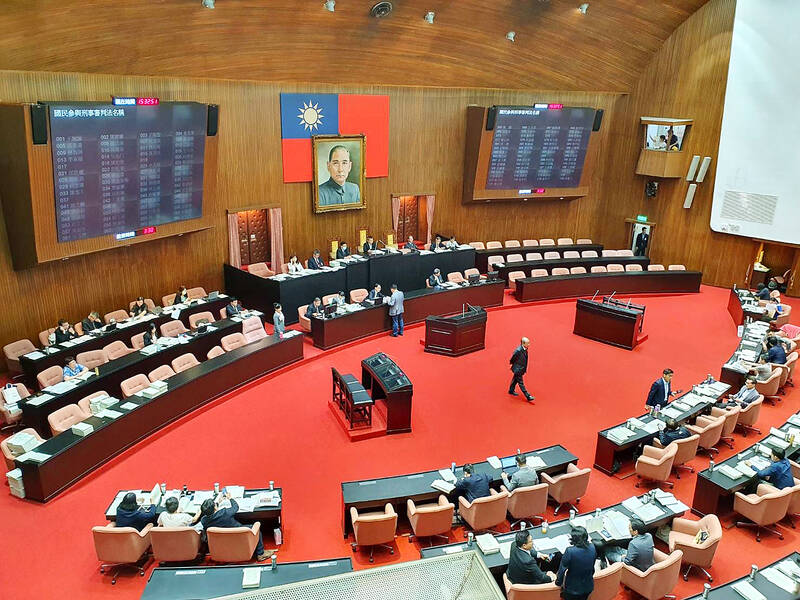The legislature yesterday passed amendments to the Criminal Code increasing the penalties for crimes associated with organized fraud and human trafficking.
Under the changes proposed jointly by the Executive Yuan and the Judicial Yuan, depriving someone of their freedom of movement and abusive behavior would incur increased sentences.
The changes are a response to an increase in organized crime groups luring people abroad, where they are held captive and forced into illegal work.

Photo: Taipei Times
Article 302 of the Criminal Code had stipulated no more than five years in prison and a fine of up to NT$9,000 (US$292) for taking another into custody or depriving their freedom of movement.
If aggravated injury results, the penalty is three to 10 years in prison, and seven years to life if the actions result in death.
The amendment adds an additional provision to the article specifying circumstances under which harsher penalties could be issued.
The circumstances include three or more people working together to commit the crime, possession of a lethal weapon, targeting a person with disabilities, abusing the victim and restricting a victim’s movement for a week or longer.
When meeting any of these criteria, the perpetrator can be sentenced to one to seven years in prison in addition to a fine of up to NT$1 million.
If aggravated injury results, the culprit can be sentenced to five to 12 years in prison, while in the event of death, the term is raised to 10 years to life.
If the offense is committed against a direct blood relative, the penalties can be increased by 50 percent.
Under the added category of “aggravated fraud” in Article 339-4, the amendment stipulates one to seven years imprisonment and a fine of up to NT$1 million for digitally producing false images, recordings or other records with the purpose of committing fraud.
The expanded penalties have completed the legal principles governing fraud and its derivative crimes, giving police and prosecutors new tools of enforcement, the Ministry of Justice said.

The Ministry of Education (MOE) is to launch a new program to encourage international students to stay in Taiwan and explore job opportunities here after graduation, Deputy Minister of Education Yeh Ping-cheng (葉丙成) said on Friday. The government would provide full scholarships for international students to further their studies for two years in Taiwan, so those who want to pursue a master’s degree can consider applying for the program, he said. The fields included are science, technology, engineering, mathematics, semiconductors and finance, Yeh added. The program, called “Intense 2+2,” would also assist international students who completed the two years of further studies in

The brilliant blue waters, thick foliage and bucolic atmosphere on this seemingly idyllic archipelago deep in the Pacific Ocean belie the key role it now plays in a titanic geopolitical struggle. Palau is again on the front line as China, and the US and its allies prepare their forces in an intensifying contest for control over the Asia-Pacific region. The democratic nation of just 17,000 people hosts US-controlled airstrips and soon-to-be-completed radar installations that the US military describes as “critical” to monitoring vast swathes of water and airspace. It is also a key piece of the second island chain, a string of

Taiwan will now have four additional national holidays after the Legislative Yuan passed an amendment today, which also made Labor Day a national holiday for all sectors. The Chinese Nationalist Party (KMT) and Taiwan People’s Party (TPP) used their majority in the Legislative Yuan to pass the amendment to the Act on Implementing Memorial Days and State Holidays (紀念日及節日實施辦法), which the parties jointly proposed, in its third and final reading today. The legislature passed the bill to amend the act, which is currently enforced administratively, raising it to the legal level. The new legislation recognizes Confucius’ birthday on Sept. 28, the

A magnitude 5.9 earthquake that struck about 33km off the coast of Hualien City was the "main shock" in a series of quakes in the area, with aftershocks expected over the next three days, the Central Weather Administration (CWA) said yesterday. Prior to the magnitude 5.9 quake shaking most of Taiwan at 6:53pm yesterday, six other earthquakes stronger than a magnitude of 4, starting with a magnitude 5.5 quake at 6:09pm, occurred in the area. CWA Seismological Center Director Wu Chien-fu (吳健富) confirmed that the quakes were all part of the same series and that the magnitude 5.5 temblor was